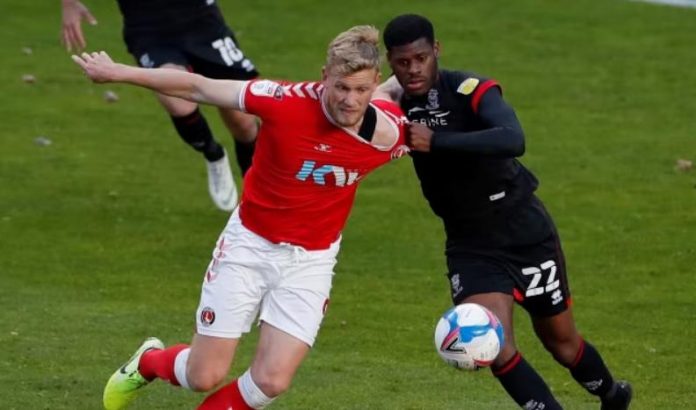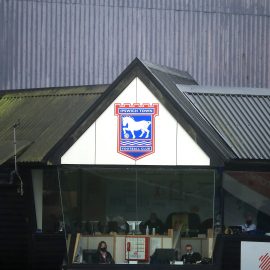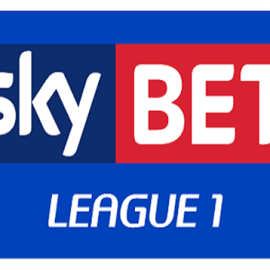Writing about Exeter City gaining promotion is starting to become an annual occurrence. This, perhaps, isn’t a sentence that I expected to write for Soccerlens. Not that you’ll get many complaints from this end.
After finally making it back into the league last season after five long years in the Conference, the Grecians have now won back-to-back promotions for the first time in their history.
This may sound like bias, but Exeter’s rise of recent years genuinely is one of the great success stories in football and proof that relegation from the league doesn’t mean the end of a club.
The Grecians have gone from a team struggling at the foot or the league to a fan-owned success story. For supporters of all generations, this is as good as it’s ever been in the history of supporting City.
We get knocked down, but we get up again
Exeter supporters with longer memories than I may be forgiven for pinching themselves and asking if we’re currently occupying some form of alternate reality. This isn’t meant to happen. This is Exeter we’re talking about; former perennial strugglers and under achievers, who’ve never been higher than the third tier of English football. A team that football writers usually reach form when making some amusingly droll point.
But that was the old Exeter. The new Exeter is backed by the fan-owners, has an admirable commitment to a youth setup that’s the envy of many bigger teams, and a bright young manager who has never finished below the playoffs since joining. This is, in short, a team on the up.
It used to be so different. In the seasons before Exeter’s relegation from the league in 2003, a good season was generally considered to include beating Plymouth and Torquay (assuming the teams were in the same league) and avoiding the drop. When City did fall through the trapdoor, they were a husk of a club – debt-laden, with their chairman and vice-chairman under arrest for fraud (they subsequently plead guilty) and real questions as to whether the club would survive.
They nearly didn’t. The Supporters’ Trust stepped in to take over Exeter. Dr. David Treharne, a Trust stalwart who took over the chairmanship of the club, has told me on many occasions how close the club was to going out of business. If the Trust hadn’t secured the shares from former owner Ivor Doble, Exeter would have, quite simply, ceased to exist.
And as the Trust got on with turning events round off the pitch, City fans started seeing their side challenging up the top of the table as opposed to the bottom. Pride returned to a club that always had a decent level of support but had precious little to cheer about in previous seasons. The fans were now running the club, City were now regularly in with a chance of promotion and St James’ Park had a buzz around it.
The arrival of the Tis
The FA Cup draw against Manchester United helped reduce their debts, but the appointment of Paul Tisdale also did much to move Exeter to a new level. Tisdale, a former Southampton and Panionios midfielder who’d spent ten games on loan at Exeter in 1997, had been manager of student side Team Bath, where he’d won four promotions in six years.
He was, perhaps, a surprise choice at the time – captain of the 1990 promotion-winning Exeter side Shaun Taylor and ex-Shrewsbury boss Jimmy Quinn were the other two names on the shortlist. To a fanbase used to the raw pitchside emotion of the likes of Alan Ball and Eamonn Dolan his calm, thoughtful manner was a marked contrast. Every question journalists asked him was given the same consideration and he rarely, if ever, lapsed into cliche.
Tisdale slowly stamped his own authority on the team, bringing in intelligent footballers and a mix of youth and experience. What’s more, Exeter were playing neat, attractive passing football, dispelling the myth that you needed a physical team of long-ball specialists to make it in the lower leagues.
Helping out was Director of Football Steve Perryman. The former Spurs legend is a world away from the same job title that many Premier League clubs have employed. Just as likely to be found tidying up at the Cat and Fiddle training ground, Perryman has been on hand to offer advice to the young manager and negotiate significant transfer fees for some of the bright young players City have sold in recent years, including Jamie Mackie to Plymouth and George Friend to Wolves.
In his first season, Tisdale led Exeter to the Conference playoff final at Wembley, where they lost 2-1 to Morecambe. The following season he was back and this time City made no mistake and veteran defender Rob Edwards – one of Tisdale’s first, and possibly best, signings – headed the Grecians to victory and a place back in the league.
Rather than overhaul the squad, Tisdale’s message to his team was clear – you got us promotion, you now have the chance to prove yourselves in League Two. There were reinforcements, such as former Ipswich striker Marcus Stewart and targetman Craig McAllister, plus the occasional loan, such as Troy Archibald-Henville from Spurs and Stuart Fleetwood from Charlton.
But the majority of the squad were the same who had taken Exeter out of the Conference, and a squad that hardly cost a penny in transfer fees. Matt Gill and goalkeeper, and player of the season, Paul Jones had both commanded small fees but were signed by previous manager Alex Inglethorpe. The rest were a mixture of free transfers, like Edwards and Stewart, or home grown players such as Dean Moxey.
The 23-year-old has already made 175 appearances for the Grecians after making the step up as a teenager during City’s first season in the Conference and has gone on to exemplify what the club is about and against Rotherham the left-sided player covered every blade of grass on the pitch.
Back to back promotions
If Tisdale had faith in his squad, the same couldn’t be said of the pundits. Many predicted Exeter would struggle back in the league, with one national newspaper pegging them to finish as low as 20th.
Privately, most fans would have happily taken any kind of upper mid-table finish. Tenth or above would have been a good season and the playoffs a fantastic one. Automatic promotion, much less finishing second and at one point challenging Brentford for the title, wasn’t even being considered by supporters at the start of August.
But after opening with a draw at Darlington and a loss at home to Shrewsbury, Exeter slowly started climbing the table. There were a few abberations such as a six-one mauling at home against Chesterfield. But there were also some great ones, such as a three-nil win at home to Gillingham, a 4-1 demolition of fellow promotion hopefuls Rochdale, and very nearly stealing all three points at Brentford. Most importantly, the Grecians were consistently picking up points.
By conceding a late equaliser at home to Morecambe in the penultimate game, though, City went into the last game of the season at Rotherham needing to match or better Bury’s result against Accrington. This in itself was a measure of how successful the season had been – from viewing the playoffs as ambitious to challenging for automatic promotion.
Rotherham’s Don Valley Stadium probably is one of the stranger places to host a promotion party. The Millers, forced out of their home at Millmoor, have temporarily relocated to the Sheffield athletics arena and you sincerely hope it is a short stay. It may look impressive, but the large running track means watching football on a distant pitch is a slightly surreal experience.
It also affects the depth perception of a visiting fan. Had the ball gone out for a throw-in or a corner at the far end? Was Bertie Cozic really in a better position to score than Stuart Fleetwood when the Exeter striker blazed over rather than squaring the ball?
What was clear was that Rotherham were giving it as good as they got, which was unsurprising when you consider they would also have been challenging at the top were it not for a points deduction. At half-time both sides had played well, with Exeter just shading it, although Rotherham had missed the best opportunity of the half.
Soon after the restart, Paul Tisdale went on the attacking, bringing on McAllister and Richard Logan and moving from a 4-5-1 to a 4-3-3. The move immediately paid dividends as Rotherham’s full-backs were pinned back and the two fresh strikers started to win the aerial battle. With the clock ticking, City looked the more likely to score.
The goal, when it did come, was a peach of a controlled header from Logan, rising above the defence to nod home Edwards’ ball. His sprint along the touchline to celebrate sent the 2,000 plus travelling Grecians into ectasy.
Four minutes later Exeter should have made it safe when McAllister was brought down when bearing down on goal, resulting in a red card for the defender, but Fleetwood’s penalty was a poor one and easily saved.
From then on it was a case of holding on and having taken the lead, City were in no mood to give it up. Rotherham attacks were repelled and there was always an outlet for any clearance. Although Bury had scored a late winner at Gigg Lane, there was no need for the travelling supporters to check their phones – Logan’s goal meant CIty were up, their first ever back-to-back promotions. The party for those staying in Sheffield would, you suspect, go on long into the night.
Planning for the future
The last time Exeter reached this level in 1990, League One was still known as the third division. With key players sold after promotion, the Grecians struggled to impose themselves and they were relegated back to the fourth tier in 1994. That seems unlikely this time around.
City’s board recently unveiled plans to redevelop the ground and make other changes off the pitch and the fan support is as strong as ever. Providing Tisdale isn’t poached away – you don’t get back-to-back promotions without attracting the attention of other clubs – the club will give him time and, you suspect, a small amount of cash to build a competitive squad.
Much will depend on hanging onto key players like Moxey and Jones, but rushing into expensive big-name signings isn’t Tisdale’s style. The type of players signed will, as likely, fit Exeter’s patient attractive style of play and he will build a squad, not just a first 11.
How Exeter fare in League One is a bit of an unknown but there’s enough to suggest the Grecians should be able to hold their own. Most fans will be happy with a mid-table finish. Mind you, we said the same last season and looked what happened. Perhaps I should already start composing my plaudits for when City get promoted to The Championship this time next season.
Photo Credit: Lou Thornley
Add Sportslens to your Google News Feed!






